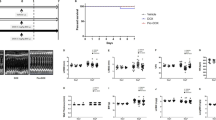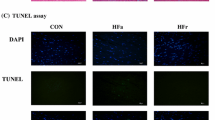Abstract
Purpose
A high-fat diet has been shown to exacerbate the cardiotoxicity associated with the chemotherapy drug doxorubicin (DOX); however, it is unknown whether switching from a high-fat diet to a low-fat diet can attenuate the intensified DOX cardiotoxicity. The purpose of this study was to investigate the effects of a low-fat diet on DOX-induced cardiotoxicity in rats previously fed a high-fat diet.
Methods
Male rats were randomly assigned to consume a Western diet or a low-fat diet for 6 weeks. Western diet-fed rats were then further randomized to switch to the low-fat diet (WD-LF) or continue with the Western diet (WD). One week later, WD-LF and WD received 1 mg/kg DOX per day for 10 consecutive days and continued with their diets (WD-LF + DOX, WD + DOX). LF was further randomized to receive 1 mg/kg DOX per day for 10 consecutive days (LF + DOX) or saline injections as a control (LF + SAL). Four weeks following the first injection, cardiac function was analyzed, and left ventricles were analyzed for cardiotoxicity indices.
Results
When compared to LF + SAL and LF + DOX, WD + DOX exhibited an enhanced cardiotoxicity as evidenced by reduced septal wall thickness, fractional shortening, and sarco-endoplasmic reticulum Ca2+ ATPase expression as well as increased left ventricular cavity dimensions, lipid peroxidation, and β-myosin heavy-chain expression. This exacerbated cardiotoxicity was not observed in WD-LF + DOX.
Conclusions
Switching to a low-fat diet 1 week prior to, during, and following DOX treatment attenuated the exacerbated cardiotoxicity observed in the previously Western diet-fed rats.





Similar content being viewed by others
References
Takemura G, Fujiwara H (2007) Doxorubicin-induced cardiomyopathy from the cardiotoxic mechanisms to management. Prog Cardiovasc Dis 49:330–352
Hayward R, Hydock DS (2007) Doxorubicin cardiotoxicity in the rat: an in vivo characterization. J Am Assoc Lab Anim Sci 46:20–32
Abu-Khalaf MM, Juneja V, Chung GG, DiGiovanna MP, Sipples R, McGurk M, Zelterman D, Haffty B, Reiss M, Wackers FJ, Lee FA, Burtness BA (2007) Long-term assessment of cardiac function after dose-dense and -intense sequential doxorubicin (A), paclitaxel (T), and cyclophosphamide (C) as adjuvant therapy for high risk breast cancer. Breast Cancer Res Treat 104:341–349
Pein F, Sakiroglu O, Dahan M, Lebidois J, Merlet P, Shamsaldin A, Villain E, de Vathaire F, Sidi D, Hartmann O (2004) Cardiac abnormalities 15 years and more after adriamycin therapy in 229 childhood survivors of a solid tumour at the Institut Gustave Roussy. Br J Cancer 91:37–44
Mitra MS, Donthamsetty S, White B, Mehendale HM (2008) High fat diet-fed obese rats are highly sensitive to doxorubicin-induced cardiotoxicity. Toxicol Appl Pharmacol 231:413–422
Yan L, DeMars LC, Johnson LK (2012) Long-term voluntary running improves diet-induced adiposity in young adult mice. Nutr Res 32:458–465
Hill JO, Melanson EL, Wyatt HT (2000) Dietary fat intake and regulation of energy balance: implications for obesity. J Nutr 130:284S–288S
Mathew A, George PS, Ildaphonse G (2009) Obesity and kidney cancer risk in women: a meta-analysis (1992–2008). Asian Pac J Cancer Prev 10:471–478
Zyromski NJ, Mathur A, Pitt HA, Wade TE, Wang S, Nakshatri P, Swartz-Basile DA, Nakshatri H (2009) Obesity potentiates the growth and dissemination of pancreatic cancer. Surgery 146:258–263
Reeves GK, Pirie K, Beral V, Green J, Spencer E, Bull D (2007) Cancer incidence and mortality in relation to body mass index in the Million Women Study: cohort study. BMJ 335:1134
Maskarinec G, Erber E, Gill J, Cozen W, Kolonel LN (2008) Overweight and obesity at different times in life as risk factors for non-Hodgkin’s lymphoma: the multiethnic cohort. Cancer Epidemiol Biomarkers Prev 17:196–203
Skelton JA, Cook SR, Auinger P, Klein JD, Barlow SE (2009) Prevalence and trends of severe obesity among US children and adolescents. Acad Pediatr 9:322–329
Wang Y, Beydoun MA, Liang L, Caballero B, Kumanyika SK (2008) Will all Americans become overweight or obese? estimating the progression and cost of the US obesity epidemic. Obesity (Silver Spring) 16:2323–2330
Cox J, Penn N, Masood M, Hancock AK, Parker D (1987) Drug overdose–a hidden hazard of obesity. J R Soc Med 80:708–709
Rodvold KA, Rushing DA, Tewksbury DA (1988) Doxorubicin clearance in the obese. J Clin Oncol 6:1321–1327
Wilson CR, Tran MK, Salazar KL, Young ME, Taegtmeyer H (2007) Western diet, but not high fat diet, causes derangements of fatty acid metabolism and contractile dysfunction in the heart of Wistar rats. Biochem J 406:457–467
Ballal K, Wilson CR, Harmancey R, Taegtmeyer H (2010) Obesogenic high fat western diet induces oxidative stress and apoptosis in rat heart. Mol Cell Biochem 344:221–230
Hydock DS, Lien CY, Schneider CM, Hayward R (2008) Exercise preconditioning protects against doxorubicin-induced cardiac dysfunction. Med Sci Sports Exerc 40:808–817
Hydock DS, Lien CY, Schneider CM, Hayward R (2007) Effects of voluntary wheel running on cardiac function and myosin heavy chain in chemically gonadectomized rats. Am J Physiol Heart Circ Physiol 293:H3254–H3264
Chicco AJ, Hydock DS, Schneider CM, Hayward R (2006) Low-intensity exercise training during doxorubicin treatment protects against cardiotoxicity. J Appl Physiol 100:519–527
Hydock DS, Lien CY, Jensen BT, Schneider CM, Hayward R (2011) Exercise preconditioning provides long-term protection against early chronic doxorubicin cardiotoxicity. Integr Cancer Ther 10:47–57
Bradford MM (1976) A rapid and sensitive method for the quantitation of microgram quantities of protein utilizing the principle of protein-dye binding. Anal Biochem 72:248–254
Chicco AJ, Schneider CM, Hayward R (2005) Voluntary exercise protects against acute doxorubicin cardiotoxicity in the isolated perfused rat heart. Am J Physiol Regul Integr Comp Physiol 289:R424–R431
Swamy AV, Gulliaya S, Thippeswamy A, Koti BC, Manjula DV (2012) Cardioprotective effect of curcumin against doxorubicin-induced myocardial toxicity in albino rats. Indian J Pharmacol 44:73–77
Olson RD, Gambliel HA, Vestal RE, Shadle SE, Charlier HA Jr, Cusack BJ (2005) Doxorubicin cardiac dysfunction: effects on calcium regulatory proteins, sarcoplasmic reticulum, and triiodothyronine. Cardiovasc Toxicol 5:269–283
Arai M, Yoguchi A, Takizawa T, Yokoyama T, Kanda T, Kurabayashi M, Nagai R (2000) Mechanism of doxorubicin-induced inhibition of sarcoplasmic reticulum Ca(2+)-ATPase gene transcription. Circ Res 86:8–14
Maeda A, Honda M, Kuramochi T, Takabatake T (1999) A calcium antagonist protects against doxorubicin-induced impairment of calcium handling in neonatal rat cardiac myocytes. Jpn Circ J 63:123–129
Mijares A, Lopez JR (2001) L-carnitine prevents increase in diastolic [CA2+] induced by doxorubicin in cardiac cells. Eur J Pharmacol 425:117–120
De Stefani E, Ronco AL, Deneo-Pellegrini H, Boffetta P, Aune D, Acosta G, Brennan P, Ferro G, Mendilaharsu M (2010) Dietary patterns and risk of advanced prostate cancer: a principal component analysis in Uruguay. Cancer Causes Control 21:1009–1016
Zhai F, Wang H, Du S, He Y, Wang Z, Ge K, Popkin BM (2009) Prospective study on nutrition transition in China. Nutr Rev 67(Suppl 1):S56–S61
Llaverias G, Danilo C, Wang Y, Witkiewicz AK, Daumer K, Lisanti MP, Frank PG (2010) A Western-type diet accelerates tumor progression in an autochthonous mouse model of prostate cancer. Am J Pathol 177:3180–3191
Newmark HL, Yang K, Kurihara N, Fan K, Augenlicht LH, Lipkin M (2009) Western-style diet-induced colonic tumors and their modulation by calcium and vitamin D in C57Bl/6 mice: a preclinical model for human sporadic colon cancer. Carcinogenesis 30:88–92
Stoll BA (1998) Breast cancer and the western diet: role of fatty acids and antioxidant vitamins. Eur J Cancer 34:1852–1856
de Azambuja E, McCaskill-Stevens W, Francis P, Quinaux E, Crown JP, Vicente M, Giuliani R, Nordenskjold B, Gutierez J, Andersson M, Vila MM, Jakesz R, Demol J, Dewar J, Santoro A, Lluch A, Olsen S, Gelber RD, Di Leo A, Piccart-Gebhart M (2010) The effect of body mass index on overall and disease-free survival in node-positive breast cancer patients treated with docetaxel and doxorubicin-containing adjuvant chemotherapy: the experience of the BIG 02–98 trial. Breast Cancer Res Treat 119:145–153
Griggs JJ, Sorbero ME, Lyman GH (2005) Undertreatment of obese women receiving breast cancer chemotherapy. Arch Intern Med 165:1267–1273
Shayne M, Crawford J, Dale DC, Culakova E, Lyman GH (2006) Predictors of reduced dose intensity in patients with early-stage breast cancer receiving adjuvant chemotherapy. Breast Cancer Res Treat 100:255–262
Greenman CG, Jagielski CH, Griggs JJ (2008) Breast cancer adjuvant chemotherapy dosing in obese patients: dissemination of information from clinical trials to clinical practice. Cancer 112:2159–2165
Mital R, Zhang W, Cai M, Huttinger ZM, Goodman LA, Wheeler DG, Ziolo MT, Dwyer KM, d’Apice AJ, Zweier JL, He G, Cowan PJ, Gumina RJ (2011) Antioxidant network expression abrogates oxidative posttranslational modifications in mice. Am J Physiol Heart Circ Physiol 300:H1960–H1970
Aragno M, Mastrocola R, Medana C, Catalano MG, Vercellinatto I, Danni O, Boccuzzi G (2006) Oxidative stress-dependent impairment of cardiac-specific transcription factors in experimental diabetes. Endocrinology 147:5967–5974
de Beer EL, Bottone AE, van Der Velden J, Voest EE (2000) Doxorubicin impairs crossbridge turnover kinetics in skinned cardiac trabeculae after acute and chronic treatment. Mol Pharmacol 57:1152–1157
Chicco AJ, Sparagna GC, McCune SA, Johnson CA, Murphy RC, Bolden DA, Rees ML, Gardner RT, Moore RL (2008) Linoleate-rich high-fat diet decreases mortality in hypertensive heart failure rats compared with lard and low-fat diets. Hypertension 52:549–555
Harmancey R, Wilson CR, Wright NR, Taegtmeyer H (2010) Western diet changes cardiac acyl-CoA composition in obese rats: a potential role for hepatic lipogenesis. J Lipid Res 51:1380–1393
Lu Z, Xu X, Hu X, Fassett J, Zhu G, Tao Y, Li J, Huang Y, Zhang P, Zhao B, Chen Y (2010) PGC-1 alpha regulates expression of myocardial mitochondrial antioxidants and myocardial oxidative stress after chronic systolic overload. Antioxid Redox Signal 13:1011–1022
Dong F, Li Q, Sreejayan N, Nunn JM, Ren J (2007) Metallothionein prevents high-fat diet induced cardiac contractile dysfunction: role of peroxisome proliferator activated receptor gamma coactivator 1alpha and mitochondrial biogenesis. Diabetes 56:2201–2212
Meckling KA, O’Sullivan C, Saari D (2004) Comparison of a low-fat diet to a low-carbohydrate diet on weight loss, body composition, and risk factors for diabetes and cardiovascular disease in free-living, overweight men and women. J Clin Endocrinol Metab 89:2717–2723
Fleming RM (2002) The effect of high-, moderate-, and low-fat diets on weight loss and cardiovascular disease risk factors. Prev Cardiol 5:110–118
Ding L, Liang X, Zhu D, Lou Y (2007) Peroxisome proliferator-activated receptor alpha is involved in cardiomyocyte differentiation of murine embryonic stem cells in vitro. Cell Biol Int 31:1002–1009
Zello GA (2006) Dietary Reference Intakes for the macronutrients and energy: considerations for physical activity. Appl Physiol Nutr Metab 31:74–79
Acknowledgments
This work was supported by UNC Provost’s Research, Dissemination, & Faculty Development funding to DSH.
Conflict of interest
None.
Author information
Authors and Affiliations
Corresponding author
Rights and permissions
About this article
Cite this article
Hydock, D.S., Lien, CY., Jensen, B.T. et al. Switching to a low-fat diet attenuates the intensified doxorubicin cardiotoxicity associated with high-fat feeding. Cancer Chemother Pharmacol 71, 1551–1560 (2013). https://doi.org/10.1007/s00280-013-2154-5
Received:
Accepted:
Published:
Issue Date:
DOI: https://doi.org/10.1007/s00280-013-2154-5




